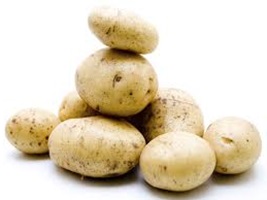Irish Potatoes Health Benefits
Irish Potatoes Health Benefits
Eating potassium-rich foods such as Irish potatoes can aid in reducing the risk of high blood pressure and decreasing the likelihood of heart disease and stroke.

Additionally, Irish potatoes are a great source of vitamin C, which is renowned for enhancing the immune system.
What are Irish potatoes?
Irish potatoes, commonly known simply as white potatoes, are a type of tuber belonging to the solanum tuberosum species.
The term “Irish potato” originated from the association of potatoes with Ireland, particularly due to the historical significance of the potato in Irish agriculture and the tragic Irish potato famine in the mid-19th century.
Table of Contents
Irish Potatoes Health Benefits: Key characteristics of Irish potatoes:
Appearance
Irish potatoes typically have brown or tan skin with white or yellow flesh. They are round to oval in shape and vary in size.
Varieties
Common varieties of Irish potatoes include russet, Yukon gold, red, and white potatoes. Each variety has its own texture and flavor profile.
Nutritional value
Carbohydrates
A significant source of complex carbohydrates, providing energy.
Vitamins and minerals
Rich in vitamin C, vitamin b6, potassium, and manganese.
Fiber
Contains dietary fiber, especially when consumed with the skin.
Antioxidants
Contains antioxidants like flavonoids, carotenoids, and phenolic acids.
Culinary uses
Versatility
Potatoes can be boiled, baked, mashed, fried, or roasted. They are used in a wide range of dishes, from simple boiled potatoes to more complex dishes like gratins, soups, and stews.
Staple food
They are a staple in many cuisines around the world due to their versatility and nutritional benefits.
Historical context
Irish potato famine
The Irish potato, particularly the lumper variety, played a crucial role in Irish history.
The dependence on a single variety led to a catastrophic famine in the 1840s when a potato blight (phytophthora infestans) decimated crops.
This event had significant social and economic impacts on Ireland.
Cultivation
Growth conditions
Potatoes thrive in well-drained, fertile soil and require a cool climate. They are typically planted in the spring and harvested in late summer to early fall.
Propagation
They are grown from “seed potatoes,” which are small tubers or pieces of tubers containing at least one eye (bud).
In summary, Irish potatoes are a versatile and nutritious food crop with a significant historical and cultural impact. They are a valuable source of energy and essential nutrients, making them a staple in many diets around the world.
Irish potatoes health benefits
Irish potatoes, commonly known as white potatoes, are a staple food with numerous health benefits. Here are some key advantages:
Nutrient-rich
Irish potatoes are a good source of essential nutrients, including vitamin C, vitamin b6, potassium, and manganese. They also contain small amounts of iron, magnesium, and phosphorus.
High in fiber
The dietary fiber in potatoes, especially when consumed with the skin, helps promote healthy digestion, prevent constipation, and support overall gut health.
Antioxidant properties
Potatoes contain antioxidants like flavonoids, carotenoids, and phenolic acids, which help neutralize harmful free radicals in the body and reduce the risk of chronic diseases.
Supports heart health
The potassium content in potatoes can help manage blood pressure by balancing out the negative effects of sodium. This contributes to maintaining cardiovascular health.
Energy source
Potatoes are rich in carbohydrates, which are the body’s primary source of energy. They provide a steady supply of glucose, which is essential for brain and muscle function.
Promotes satiety
The high fiber and carbohydrate content in potatoes make them filling, which can help control appetite and reduce overall calorie intake, supporting weight management.
Gluten-free
Naturally, potatoes are gluten-free, making them an excellent dietary choice for those with celiac disease or gluten sensitivity.
Versatile and easy to digest
Potatoes can be prepared in various ways (boiled, baked, mashed, etc.), and are generally easy to digest, making them suitable for people with different dietary needs and preferences.
Supports bone health
Potatoes contain important nutrients like magnesium and phosphorus, which are essential for maintaining healthy bone structure and strength.
Improves skin health
The Vitamin C and b6 in potatoes contribute to collagen production, which is vital for skin health and repair.
To maximize these health benefits, it’s best to prepare potatoes in healthier ways, such as baking or boiling, rather than frying, and to consume them with the skin on to retain the maximum amount of nutrients.
Irish Potatoes: Nutritional Benefits for Babies
Irish potatoes can be a nutritious addition to a baby’s diet, offering several health benefits:
Energy supply
Potatoes are a good source of carbohydrates, which provide energy necessary for a baby’s growth and development.
Vitamin c
This vitamin supports the immune system and helps absorb iron, which is crucial for preventing anemia and supporting overall health.
Vitamin b6
Important for brain development and function, vitamin b6 also aids in the production of neurotransmitters.
Potassium
Essential for muscle function, including the heart, potassium also helps maintain fluid balance in the body.
Iron
Potatoes contain a small amount of iron, which is important for the formation of hemoglobin and the prevention of anemia.
Magnesium and phosphorus
These minerals are crucial for bone development and energy production.
Fiber
The fiber in potatoes, especially when the skin is included, helps promote healthy digestion and can prevent constipation in babies.
Antioxidants
Potatoes contain antioxidants like vitamin C, which help protect cells from damage and support overall health.
Introducing Potatoes to Babies
Age
Potatoes can typically be introduced to a baby’s diet around 6 months of age, coinciding with the introduction of solid foods.
Preparation
Potatoes should be well-cooked, mashed, or pureed to ensure they are easy for the baby to eat and digest. Avoid adding salt, butter, or other seasonings initially.
Variety
As the baby grows, you can introduce potatoes in different forms, such as baked or boiled and mix them with other vegetables or proteins to enhance their nutritional value and flavor.

Recipes for Babies
Mashed potatoes
Boil and mash potatoes with a little water or breast milk/formula to achieve a smooth consistency.
Potato and carrot puree
Combine boiled potatoes and carrots and blend them for a nutrient-rich puree.
Potato and pea mash
Mix mashed potatoes with peas for added protein and fiber.
By including potatoes as part of a balanced diet, you can help ensure your baby receives a variety of essential nutrients necessary for healthy growth and development.


